but,than引导定语从句和before,until用法辨析
- 格式:docx
- 大小:16.55 KB
- 文档页数:4
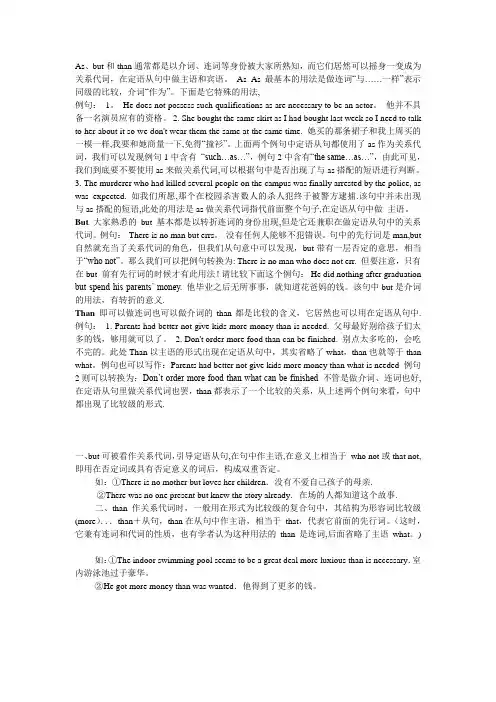
As、but和than通常都是以介词、连词等身份被大家所熟知,而它们居然可以摇身一变成为关系代词,在定语从句中做主语和宾语。
As As最基本的用法是做连词“与……一样”表示同级的比较,介词“作为”。
下面是它特殊的用法,例句:1。
He does not possess such qualifications as are necessary to be an actor。
他并不具备一名演员应有的资格。
2. She bought the same skirt as I had bought last week so I need to talk to her about it so we don't wear them the same at the same time. 她买的那条裙子和我上周买的一模一样,我要和她商量一下,免得“撞衫”。
上面两个例句中定语从句都使用了as作为关系代词,我们可以发现例句1中含有“such…as…”,例句2中含有“the same…as…”,由此可见,我们到底要不要使用as来做关系代词,可以根据句中是否出现了与as搭配的短语进行判断。
3. The murderer who had killed several people on the campus was finally arrested by the police, as was expected. 如我们所愿,那个在校园杀害数人的杀人犯终于被警方逮捕.该句中并未出现与as搭配的短语,此处的用法是as做关系代词指代前面整个句子,在定语从句中做主语。
But大家熟悉的but基本都是以转折连词的身份出现,但是它还兼职在做定语从句中的关系代词。
例句:There is no man but errs。
没有任何人能够不犯错误。
句中的先行词是man,but 自然就充当了关系代词的角色,但我们从句意中可以发现,but带有一层否定的意思,相当于“who not”。
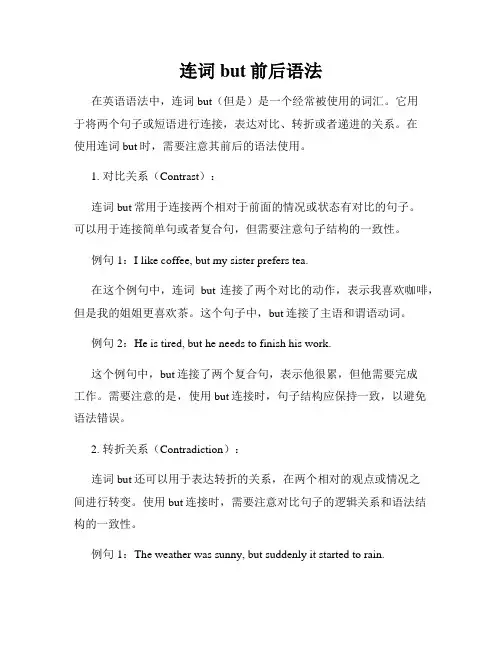
连词but前后语法在英语语法中,连词but(但是)是一个经常被使用的词汇。
它用于将两个句子或短语进行连接,表达对比、转折或者递进的关系。
在使用连词but时,需要注意其前后的语法使用。
1. 对比关系(Contrast):连词but常用于连接两个相对于前面的情况或状态有对比的句子。
可以用于连接简单句或者复合句,但需要注意句子结构的一致性。
例句1:I like coffee, but my sister prefers tea.在这个例句中,连词but连接了两个对比的动作,表示我喜欢咖啡,但是我的姐姐更喜欢茶。
这个句子中,but连接了主语和谓语动词。
例句2:He is tired, but he needs to finish his work.这个例句中,but连接了两个复合句,表示他很累,但他需要完成工作。
需要注意的是,使用but连接时,句子结构应保持一致,以避免语法错误。
2. 转折关系(Contradiction):连词but还可以用于表达转折的关系,在两个相对的观点或情况之间进行转变。
使用but连接时,需要注意对比句子的逻辑关系和语法结构的一致性。
例句1:The weather was sunny, but suddenly it started to rain.在这个例句中,but连接了两个句子,表示天气晴朗,但突然下起了雨。
但是此时天气发生了突变,表示对比。
例句2:She was excited about the job offer, but she decided to decline it.这个例句中,but表达了两个相反的行为,表示她对这个工作机会感到兴奋,但最终决定不接受它。
但是是她的内心发生了转折,改变了她的决定。
3. 递进关系(Progression):除了对比和转折关系,but还可以用于表达递进的关系。
在表达递进的关系时,但需要注意保持语境的逻辑一致性。
例句1:He was tired, but he kept working.这个例句中,but表示了递进的关系,表示尽管他很累,但是他坚持工作。
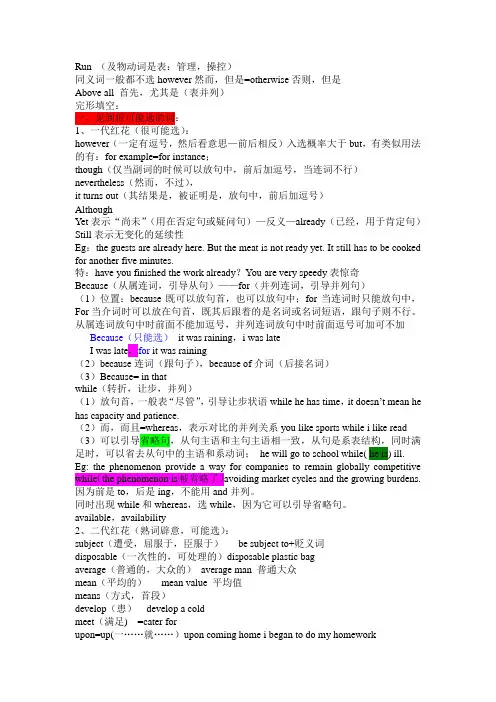
Run (及物动词是表:管理,操控)同义词一般都不选however然而,但是=otherwise否则,但是Above all 首先,尤其是(表并列)完形填空:一、见到很可能选的词:1、一代红花(很可能选):however(一定有逗号,然后看意思—前后相反)入选概率大于but,有类似用法的有:for example=for instance;though(仅当副词的时候可以放句中,前后加逗号,当连词不行)nevertheless(然而,不过),it turns out(其结果是,被证明是,放句中,前后加逗号)AlthoughYet表示“尚未”(用在否定句或疑问句)—反义—already(已经,用于肯定句)Still表示无变化的延续性Eg:the guests are already here. But the meat is not ready yet. It still has to be cooked for another five minutes.特:have you finished the work already?You are very speedy表惊奇Because(从属连词,引导从句)——for(并列连词,引导并列句)(1)位置:because既可以放句首,也可以放句中;for当连词时只能放句中,For当介词时可以放在句首,既其后跟着的是名词或名词短语,跟句子则不行。
从属连词放句中时前面不能加逗号,并列连词放句中时前面逗号可加可不加Because(只能选)it was raining,i was lateI was late,for it was raining(2)because连词(跟句子),because of介词(后接名词)(3)Because= in thatwhile(转折,让步,并列)(1)放句首,一般表“尽管”,引导让步状语while he has time,it doesn’t mean he has capacity and patience.(2)而,而且=whereas,表示对比的并列关系you like sports while i like read (3)可以引导省略句,从句主语和主句主语相一致,从句是系表结构,同时满足时,可以省去从句中的主语和系动词;he will go to school while( he is) ill. Eg: the phenomenon provide a way for companies to remain globally competitive while(the phenomenon is被省略了)avoiding market cycles and the growing burdens. 因为前是to,后是ing,不能用and并列。
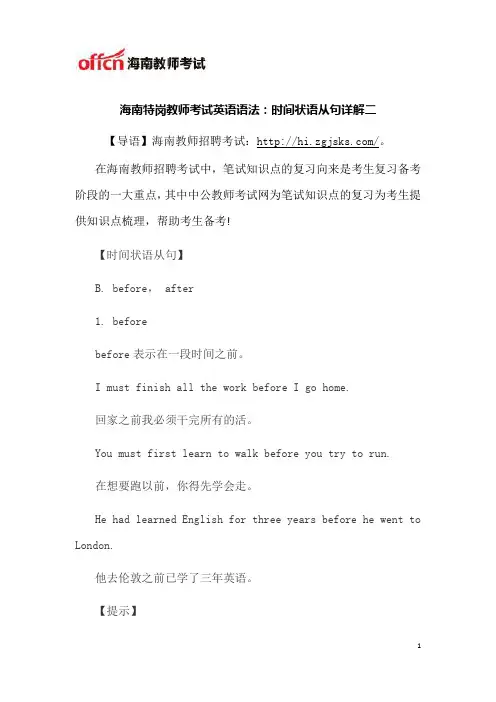
海南特岗教师考试英语语法:时间状语从句详解二【导语】海南教师招聘考试:/。
在海南教师招聘考试中,笔试知识点的复习向来是考生复习备考阶段的一大重点,其中中公教师考试网为笔试知识点的复习为考生提供知识点梳理,帮助考生备考!【时间状语从句】B. before, after1. beforebefore表示在一段时间之前。
I must finish all the work before I go home.回家之前我必须干完所有的活。
You must first learn to walk before you try to run.在想要跑以前,你得先学会走。
He had learned English for three years before he went to London.他去伦敦之前已学了三年英语。
【提示】before 从句往往带有否定的含义。
He ran off before I could stop him.我还没来得及阻止他,他就跑掉了。
Take it down before you forget it.趁着还没忘记的时候就记录下来。
【必背】before 常用句型 It is / was / will be +beforeIt will be five years before we meet again.五年以后我们才能再见。
It will be not long before you regret what you have done. 不用过多久你就会对你所作所为感到后悔的。
It was not long before I realized I was wrong.不久我就意识到我错了。
It was minutes before the police arrived.过了几分钟警察才到。
2. afterafter表在一段时间之后。
Let's play football after school is over.放学后我们踢足球吧。
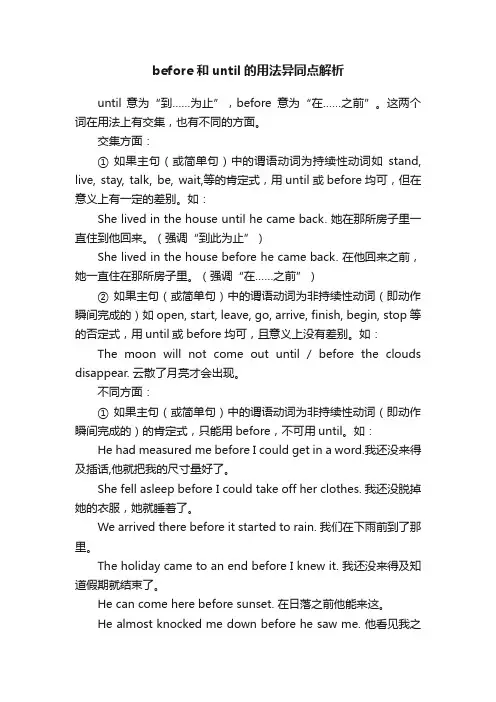
before和until的用法异同点解析until 意为“到……为止”,before意为“在……之前”。
这两个词在用法上有交集,也有不同的方面。
交集方面:① 如果主句(或简单句)中的谓语动词为持续性动词如stand, live, stay, talk, be, wait,等的肯定式,用until或before均可,但在意义上有一定的差别。
如:She lived in the house until he came back. 她在那所房子里一直住到他回来。
(强调“到此为止”)She lived in the house before he came back. 在他回来之前,她一直住在那所房子里。
(强调“在……之前”)② 如果主句(或简单句)中的谓语动词为非持续性动词(即动作瞬间完成的)如open, start, leave, go, arrive, finish, begin, stop等的否定式,用until或before均可,且意义上没有差别。
如:The moon will not come out until / before the clouds disappear. 云散了月亮才会出现。
不同方面:① 如果主句(或简单句)中的谓语动词为非持续性动词(即动作瞬间完成的)的肯定式,只能用before,不可用until。
如:He had measured me before I could get in a word.我还没来得及插话,他就把我的尺寸量好了。
She fell asleep before I could take off her clothes. 我还没脱掉她的衣服,她就睡着了。
We arrived there before it started to rain. 我们在下雨前到了那里。
The holiday came to an end before I knew it. 我还没来得及知道假期就结束了。
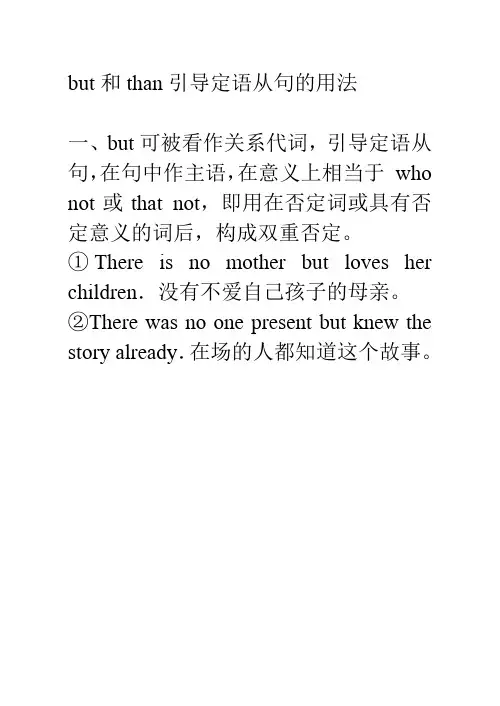
but和than引导定语从句的用法一、but可被看作关系代词,引导定语从句,在句中作主语,在意义上相当于who not或that not,即用在否定词或具有否定意义的词后,构成双重否定。
①There is no mother but loves her children.没有不爱自己孩子的母亲。
②There was no one present but knew the story already.在场的人都知道这个故事。
二、than作关系代词时,一般用在形式为比较级的复合句中,其结构为形容词比较级(more)...than+从句,than在从句中作主语,相当于that,代表它前面的先行词。
这时,它兼有连词和代词的性质①The indoor swimming pool seems to bea great deal more luxurious than is necessary.室内游泳池过于豪华。
②He got more money than was wanted.他得到了更多的钱。
运用上述知识翻译下列句子:1.任何人都喜欢被赞扬。
(but)2.我们大家都想去桂林。
(but)3.没有人不同情那些贫困的孩子。
(but)4.我们班上没有一个人不想帮你。
(but)5.这件事情比想象的要复杂。
(than)6.这个广告的效果比预想的要好。
(than)7.这个问题看起来容易,实际上很难。
(than)8.他爸妈给他的零用钱总是超过他的需要。
(than)答案:1.There is no one but likes to be praised.2.There is no one of us but wishes to visit Guilin.3.There is no man but feels pity for those poor children.4.There is no one in our class but wants to help you.5.This matter is more complex/ complicated than is imagined.6.This advertisement is more affective than is expected.7.The problem may be more difficult in nature than would appear.8.He got more pocket money from his parents than was demanded.5.无论多么荒凉,多么难以行走的地方,人们也能把它变成战场?(but)5.There is no country so wild and difficult but will be made a theatre of war.。
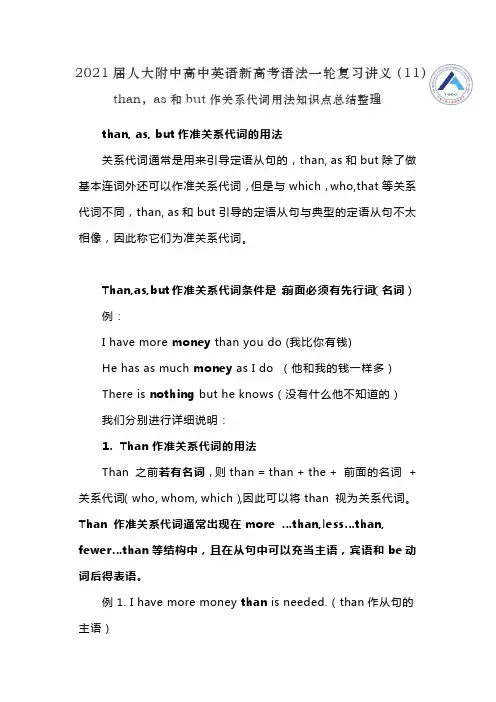
2021届人大附中高中英语新高考语法一轮复习讲义(11)than,as和but作关系代词用法知识点总结整理than, as, but作准关系代词的用法关系代词通常是用来引导定语从句的,than, as和but除了做基本连词外还可以作准关系代词,但是与which,who,that等关系代词不同,than, as和but引导的定语从句与典型的定语从句不太相像,因此称它们为准关系代词。
Than,as,but作准关系代词条件是:前面必须有先行词(名词)例:I have more money than you do (我比你有钱)He has as much money as I do (他和我的钱一样多)There is nothing but he knows(没有什么他不知道的)我们分别进行详细说明:1.Than 作准关系代词的用法Than 之前若有名词,则than = than + the + 前面的名词+ 关系代词(who, whom, which),因此可以将than 视为关系代词。
Than 作准关系代词通常出现在more …than,less…than, fewer…than等结构中,且在从句中可以充当主语,宾语和be动词后得表语。
例1. I have more money than is needed.(than作从句的主语)= I have more money than the money which is needed (我现有的钱比所需要的多)例2. I have more money than h e needs(than作从句的宾语)I have more money than the money which he needs(我现有的钱比他所需要的多)例3. heis a better student than you(are ).(than 作从句的表语)2.As 作准关系代词的用法as之前若有名词,则as = as + the + 前面的名词+ 关系代词(who, whom, which),因此可以将as 可视为关系代词,并在所引导的从句中作主语,宾语和be动词之后的表语。
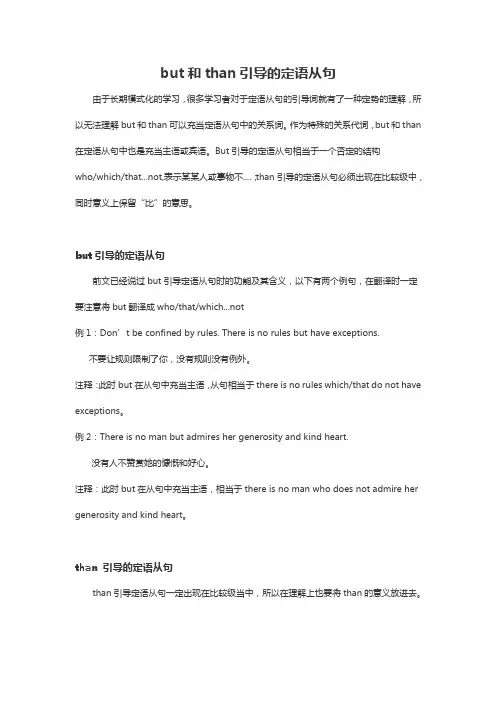
but和than引导的定语从句由于长期模式化的学习,很多学习者对于定语从句的引导词就有了一种定势的理解,所以无法理解but和than可以充当定语从句中的关系词。
作为特殊的关系代词,but和than 在定语从句中也是充当主语或宾语。
But引导的定语从句相当于一个否定的结构who/which/that...not,表示某某人或事物不....;than引导的定语从句必须出现在比较级中,同时意义上保留“比”的意思。
but引导的定语从句前文已经说过but引导定语从句时的功能及其含义,以下有两个例句,在翻译时一定要注意将but翻译成who/that/which...not例1:Don’t be confined by rules. There is no rules but have exceptions.不要让规则限制了你,没有规则没有例外。
注释:此时but在从句中充当主语,从句相当于there is no rules which/that do not have exceptions。
例2:There is no man but admires her generosity and kind heart.没有人不赞赏她的慷慨和好心。
注释:此时but在从句中充当主语,相当于there is no man who does not admire her generosity and kind heart。
than 引导的定语从句than引导定语从句一定出现在比较级当中,所以在理解上也要将than的意义放进去。
例1:Children today are likely to have less supervision at home than was common in the traditional family structure. (此时than在句中充当主语)与传统家庭结构相比,现代家庭结构中的孩子受到的管教表少了。
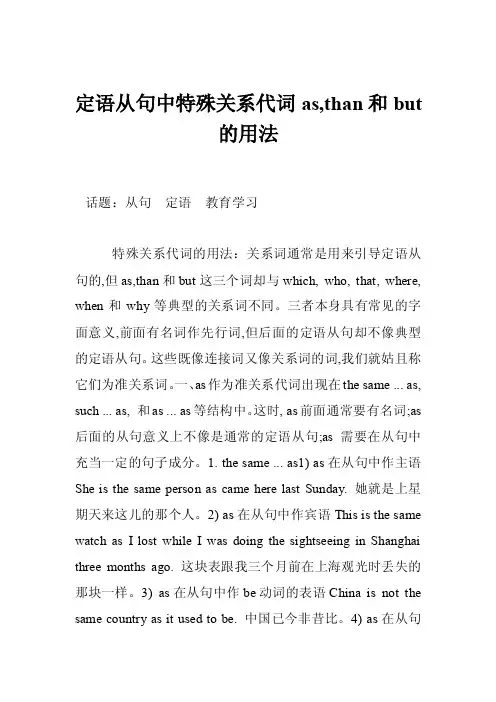
定语从句中特殊关系代词as,than和but的用法话题:从句定语教育学习特殊关系代词的用法:关系词通常是用来引导定语从句的,但as,than和but这三个词却与which, who, that, where, when和why等典型的关系词不同。
三者本身具有常见的字面意义,前面有名词作先行词,但后面的定语从句却不像典型的定语从句。
这些既像连接词又像关系词的词,我们就姑且称它们为准关系词。
一、as作为准关系代词出现在the same ... as, such ... as, 和as ... as等结构中。
这时, as前面通常要有名词;as 后面的从句意义上不像是通常的定语从句;as需要在从句中充当一定的句子成分。
1. the same ... as1) as在从句中作主语She is the same person as came here last Sunday. 她就是上星期天来这儿的那个人。
2) as在从句中作宾语This is the same watch as I lost while I was doing the sightseeing in Shanghai three months ago. 这块表跟我三个月前在上海观光时丢失的那块一样。
3) as在从句中作be动词的表语China is not the same country as it used to be. 中国已今非昔比。
4) as在从句中作行为方式状语You should learn to do housework in the same way as your mother does it. 你应该学会像你母亲那样做家务活。
2. such ... as1) as在从句中作主语Let children read such books as tend to make them better and brighter. 让孩子看那些容易让他们变得更好更聪明的书。
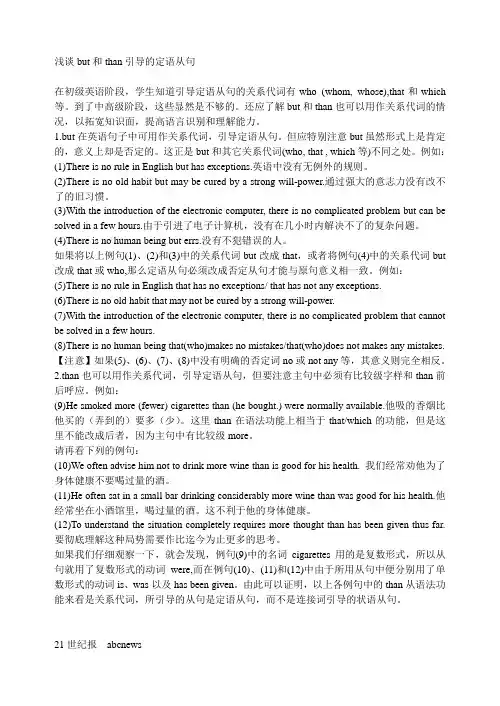
浅谈but和than引导的定语从句在初级英语阶段,学生知道引导定语从句的关系代词有who (whom, whose),that和which 等。
到了中高级阶段,这些显然是不够的。
还应了解but和than也可以用作关系代词的情况,以拓宽知识面,提高语言识别和理解能力。
1.but在英语句子中可用作关系代词,引导定语从句。
但应特别注意but虽然形式上是肯定的,意义上却是否定的。
这正是but和其它关系代词(who, that , which等)不同之处。
例如:(1)There is no rule in English but has exceptions.英语中没有无例外的规则。
(2)There is no old habit but may be cured by a strong will-power.通过强大的意志力没有改不了的旧习惯。
(3)With the introduction of the electronic computer, there is no complicated problem but can be solved in a few hours.由于引进了电子计算机,没有在几小时内解决不了的复杂问题。
(4)There is no human being but errs.没有不犯错误的人。
如果将以上例句(1)、(2)和(3)中的关系代词but改成that,或者将例句(4)中的关系代词but 改成that或who,那么定语从句必须改成否定从句才能与原句意义相一致。
例如:(5)There is no rule in English that has no exceptions/ that has not any exceptions.(6)There is no old habit that may not be cured by a strong will-power.(7)With the introduction of the electronic computer, there is no complicated problem that cannot be solved in a few hours.(8)There is no human being that(who)makes no mistakes/that(who)does not makes any mistakes. 【注意】如果(5)、(6)、(7)、(8)中没有明确的否定词no或not any等,其意义则完全相反。
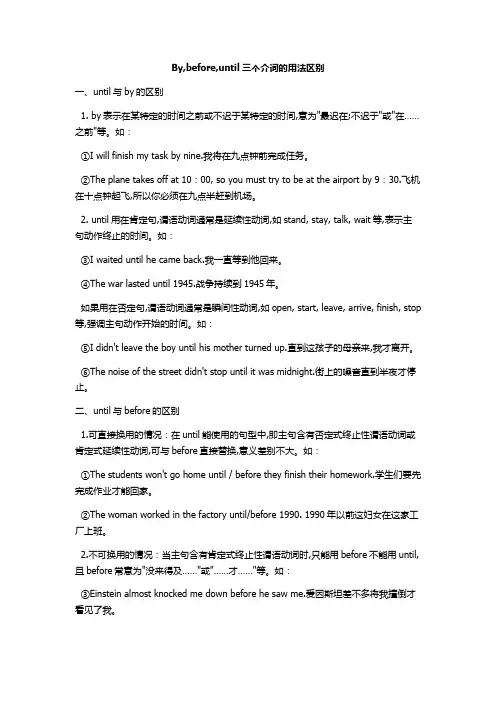
By,before,until三个介词的用法区别一、until与by的区别1. by表示在某特定的时间之前或不迟于某特定的时间,意为"最迟在;不迟于"或"在……之前"等。
如:①I will finish my task by nine.我将在九点钟前完成任务。
②The plane takes off at 10:00, so you must try to be at the airport by 9:30.飞机在十点钟起飞,所以你必须在九点半赶到机场。
2. until用在肯定句,谓语动词通常是延续性动词,如stand, stay, talk, wait等,表示主句动作终止的时间。
如:③I waited until he came back.我一直等到他回来。
④The war lasted until 1945.战争持续到1945年。
如果用在否定句,谓语动词通常是瞬间性动词,如open, start, leave, arrive, finish, stop 等,强调主句动作开始的时间。
如:⑤I didn't leave the boy until his mother turned up.直到这孩子的母亲来,我才离开。
⑥The noise of the street didn't stop until it was midnight.街上的噪音直到半夜才停止。
二、until与before的区别1.可直接换用的情况:在until能使用的句型中,即主句含有否定式终止性谓语动词或肯定式延续性动词,可与before直接替换,意义差别不大。
如:①The students won't go home until / before they finish their homework.学生们要先完成作业才能回家。
②The woman worked in the factory until/before 1990. 1990年以前这妇女在这家工厂上班。
英语语法词汇解析but作为关系代词用法but作为转折连词和介词的用法,很常见,很简单,前期文章多有论述,今天专门讲解这个词作为关系代词引导定语从句的用法。
引导定语从句的有who, whose, why, that, which, where 等关系代词和关系副词,但是but 也可以作为关系代词引导定语从句,今后应该是一个热门考点:1. but 作为关系代词引导定语从句时,一般用于否定句中,相当于who…not或that…not及which…not。
主句一般时否定句,而but 引导的出本身带有否定意味,这样就是双重否定来加强肯定语气。
but 在从句中可以作主语、宾语。
也就是说不必再加上其他词作主语或宾语了,即there is(are)no + 名词+ who(whom, which, that)…not= there is(are)no + 名词+ but……注意:定语从句中有be 动词保留be动词例:There is no one who is not interested in it.=There is no one but is interested in it没有人不对他感兴趣。
(but在从句中可以作主语)反过来,定语从句中有助动词(can,will,may,should…)保留该助动词。
There is nothing that he can not do.=There is nothing but he can do.没有什么事是他做不来的。
(but在从句中可以作宾语)定语从句中有do,does和did等助动词时,先去掉助动词,再依时态人称将之后的动词还原。
There is no book which he doesn't like to read.= There is no book but he likes to read..没有一本书是他不想看的。
There is no man but wants to spend Spring Festival with family.=There is no man who does not want to spend Spring Festival with family. 大家注意原句中用的是wants.没有一个人不想和家人一起过春节。
than引导定语从句than引导定语从句Than经常考的知识点有两个:than引导定语从句和引导状语从句。
很多同学对于than引导的定语从句和状语从句区分不好,下面是店铺整理的than引导定语从句,欢迎阅览。
一、than引导定语从句大家先看一个普通的定语从句:Children are likely to have the supervision at home that was common in the traditional family structure. 句子先行词前面的冠词和关系代词已经标出下划线,若用“more/less than”结构引导定语从句,则只需要用“more/less”换上句中的冠词“the”,用关系代词“than”代替“that”即可。
句子则变成:Children are likely to have less supervision at home than was common in the traditional family structure.Than引导定语从句必须要表示比较的“more”或者“less”词语的出现,构成比较结构,“more”或者“less”修饰名词,此是“more”或者“less”是形容词,其修饰的名词即为先行词。
Than在定语从句中做主语较多,但也会做宾语。
例如:He soon found it easy to make more money by thieving than his father had done by a lifetime of honest work. 此句中被“more”修饰的“money”是先行词,从句中“had done”是代替“have made”,以防重复,即 have made money。
二、than引导状语从句我们都知道,副词在句子中一般做状语,用来修饰动词、形容词、副词或者以动词为中心的句子。
状语从句的本质是句子作副词,然后在另一个句子中做状语的成分。
as,but和than的区别和⽤法定语从句是⼤家⾮常熟悉的⼀种从句,在考试中可以说是⽆处不在。
说到定语从句的关系代词,⼤家肯定会异⼝同声地喊出“that”“which”“who”……今天我们要讲讲as、but和than这三个特殊的关系代词。
As、but和than通常都是以介词、连词等⾝份被⼤家所熟知,⽽它们居然可以摇⾝⼀变成为关系代词,在定语从句中做主语和宾语。
AsAs最基本的⽤法是做连词“与……⼀样”表⽰同级的⽐较,介词“作为”。
下⾯是它特殊的⽤法,例句:1. He does not possess such qualifications as are necessary to be an actor.他并不具备⼀名演员应有的资格。
2. She bought the same skirt as I had bought last week so I need to talk to her about it so we don't wear them the same at the same time.她买的那条裙⼦和我上周买的⼀模⼀样,我要和她商量⼀下,免得“撞衫”。
上⾯两个例句中定语从句都使⽤了as作为关系代词,我们可以发现例句1中含有“such…as…”,例句2中含有“the same…as…”,由此可见,我们到底要不要使⽤as来做关系代词,可以根据句中是否出现了与as搭配的短语进⾏判断。
3. The murderer who had killed several people on the campus was finally arrested by the police, as was expected.如我们所愿,那个在校园杀害数⼈的杀⼈犯终于被警⽅逮捕。
该句中并未出现与as搭配的短语,此处的⽤法是as做关系代词指代前⾯整个句⼦,在定语从句中做主语。
But⼤家熟悉的but基本都是以转折连词的⾝份出现,但是它还兼职在做定语从句中的关系代词。
干货:but—充当定语从句中关系代词的情形(配有较全例句)but此时的词性是属于pron. 确切地说是关系词中的关系代词的词性,这个语法功用以及其相应的汉语语义在许多词典中少有提及。
通常but前面有否定词(或否定短语)等结构,而之后but,在结构上相当于that…not…,或who…not…,或which…not…的语法功用,对应的汉语语义也相同,这个结构中的but在其后所引接的定语从句中,充当关系代词,作主语,故不可省略。
尽管目前的中高考英语,尚未考查该结构,但作为教授英语的老师还是有所必要地了解并加以掌握更为自信(记得有个学生,N年前去某一高中教育补习机构讲解定语从句,提及了but的这种用法,该机构人员包括学术总监一脸茫然。
)。
【鉴于一般词典例句较少,这里多提供一些具体例证。
】《英汉大词典》(主编陆谷孙第2版)第253页but1词条IVbut pron.(关系代词,相当于who…not,which…not)Nobody knew him but respected him. 认识他的人无不尊敬他。
《文馨当代英汉词典》第259页but词条(pron.)but(在否定词之后作为限定词用法)(古)不…(者)(= that…not)There is no one but loves (= that does not love) her. 没有人不爱她。
《新时代英汉大词典》(张柏然主编)第301页but词条V pron.but(相当于who…not或which…not)None visit him but has exceptions. 拜访他的人都能饱餐一顿。
There is no rule but has exceptions. 凡是规律都有例外。
《21世纪大英汉词典》(李华驹主编)第374页词条7but没有不…的(= who或which not)No leader in this country ever existed but he was a revolutionary. (原文中的he必须去除)在这个国家没有一个领导人不是革命者的。
定语从句特殊用法定语从句中的特殊用法定语从句是起定语作用的,修饰,说明名词,代词或句子内容的从句,被定语从句修饰的词叫做先行词。
引导定语从句,并在句中担任成分的词叫做关系代词或关系副词。
定语从句是高考常考内容之一,使用时要尤其注意以下十种特殊用法。
一、只用that不用which的情况1、当先行词是all, little, few, much, something, everything, anything, nothing, none等不定代词时。
如:Everything that happened then was like a nightmare.当时发生的一切就像是一场噩梦。
I will tell him all that you told me at the ball.我要把你在舞会上跟我说的话全都告诉他。
2、当先行词被only, any, few, little, no, all, just, very(恰好的,表示强调)等词修饰时。
例如:The only thing that we could do was to wait.我们能做的只是等待。
That’s the very thing that we can do.那正是我们能做的事。
3、当先行词是序数词、形容词最高级或先行词被序数词或形容词最高级修饰时。
例如:The first place that we visited was the Great Wall.我们参观的第一个地方是长城。
This is the best novel that I have ever read.这是我看过的最好的小说。
4、被修饰词为数词时。
例如:Yesterday I caught two fish and put them in a basin of water. Now you can see the two that are still alive. 昨天我捉到了两条鱼,把它们放在一盆水里。
but和than引导定语从句的用法
一、but可被看作关系代词,引导定语从句,在句中作主语,在意义上相当于 who not或that not,即用在否定词或具有否定意义的词后,构成双重否定。
如:①There is no mother but loves her children.没有不爱自己孩子的母亲。
②There was no one present but knew the story already.在场的人都知道这个故事。
二、than作关系代词时,一般用在形式为比较级的复合句中,其结构为形容词比较级(more)...than+从句,than在从句中作主语,相当于that,代表它前面的先行词。
(这时,它兼有连词和代词的性质,也有学者认为这种用法的than是连词,后面省略了主语what。
)
如:①The indoor swimming pool seems to be a great deal more luxious than is necessary.室内游泳池过于豪华。
②He got more money than was wanted.他得到了更多的钱。
运用上述知识翻译下列句子:
1.任何人都喜欢被赞扬。
(but)
2.我们大家都想去桂林。
(but)
3.没有人不同情那些嗷嗷待哺的孩子。
(but)
4.我们班上没有一个人不想帮你。
(but)
5.无论多么荒凉,多么难以行走的地方,人们也能把它变成战畅(but)6.这件事情比想象的要复杂。
(than)
7.这个广告的效果比预想的要好。
(than)
8.这个问题看起来容易,实际上很难。
(than)
9.他爸妈给他的零用钱总是超过他的需要。
(than)
10.因为这项工程非常困难,所以需要投入更多的劳动力。
(than)
答案: 1.There is no one but likes to be praised.
2.There is no one of us but wishes to visit Guilin.
3.There is no man but feels pity for those starving children.4.There is no one in our class but wants to help you.
5.There is no country so wild and difficult but will be made a theatre of war.
6.This matter is more complex than is imagined.
7.This advertisement is more affective than is expected.
8.The problem may be more difficult in nature than would appear.9.He got more pocket money from his parents than was demanded.
10.The project requires more labor than has been put in because it is extremely difficult.
before 与until
在日常的英语学习中,我们遇到before和until时,往往会将二者搞错。
其实,只要我们能把握住两者在使用时本身的含义及主句动词是终止性的还是延续性的,是肯定式还是否定式两大特点,就能很容易地解决这类问题。
一。
Before表示“在… 之前”,而until表示“直到…才…”,主句肯定表示主句动作的终止时间,主句否定强调动作的起始时间。
1,主句为否定时,谓语动词为终止性动词。
常见的动词有open, start, leave,
go, arrive, finish, begin, stop, etc. For example:
1), The noise of the street didn’t stop before/until it was midnight.
2), The children won’t come back until/before it is dark.
3), I didn’t leave the lonely boy before/until his mother came home.
2,主句为肯定式,谓语为延续性动词。
这类动词有:stand, live, stay, talk, be,
wait, etc.
For example:
1). He lived with his parents until/before he graduated from school.
2). I will wait before/until he comes to my help.
3). I shall stay here until/before you come back.
二。
下列情况下宜用before不用until.
1。
主句为肯定式,谓语为终止性动词时只用before. For example:
1). He fell asleep before I could take off his clothes.
2). We arrived there before it started to rain.
3). The holiday came to an end before I knew it.
4). He almost knocked me down before he saw me.
2。
主句谓语动词强调动作的迟缓性,只用before,这时常伴有时间段状语或时间段暗示。
For example:
It was quite a long time before he found the elephant.过了很长时间,他才找到
大象。
We had walked a long way before we found some water.走了很长的路我们才找
到水。
We had sailed for two days before we saw the land.航行了两天我们才发现陆地。
It was midnight before my brother came home.我哥哥直到半夜才回来。
3。
如果强调从句谓语动作未发生就发生主句谓语动作,只用before,这时常译为“未及(不等)……就……” For example:
1)We can leave early in the morning before it gets too hot.趁天还不太热,我们上午早点离开。
2)I must write it down before I forget it.趁我还未忘,我必须把它记下来。
4。
表示“与其说……倒不如……”,“与其……毋宁……”的意思时只用before.
I would give up my job before I agree to be dismissed. 我与其被解雇还不如先
辞职。
He will die of hunger before he steals.他宁愿饿死也不愿意去偷。
5.在某些特定句型中用before。
It was (not) long before…(不久)过了很长时间才…
It will (not) be long before…(不到)要过很长时间才会… For example:
It will probably not be long before they understand each other. 他们大概过不久
就会互相了解。
It was not long before the whole country rose up. 不久全国人民奋起反抗。
三.下列情况一般使用until
1。
主句是持续性谓语动词时,肯定,否定都可以,但意义完全不同,肯定表示动作终止,而否定表示动作开始。
For example:
1).We discussed the problem until/before he came back. 我们一直讨论到他回来。
2).We didn’t d iscuss the problem until he came back. 我们一直等他回来才讨论问题。
2.Not…until…句型尽管在某些情况下可与before互换使用,但在强调句中一般仍用until; 1). It was not until he told me that I knew it.直到他告诉我我才知道这件事。
2).It was not until he finished his homework that he went home.直到完成作业他
才回家。
3放于句首时用until. For example:
Until he finished his homework ,he didn’t go home. 直到完成作业他才回家。
应注意:在使用not until时,若not until放于句首,句子应部分倒装。
For example:Not until he finished his homework,did he go home. 直到完成作业他才回家。